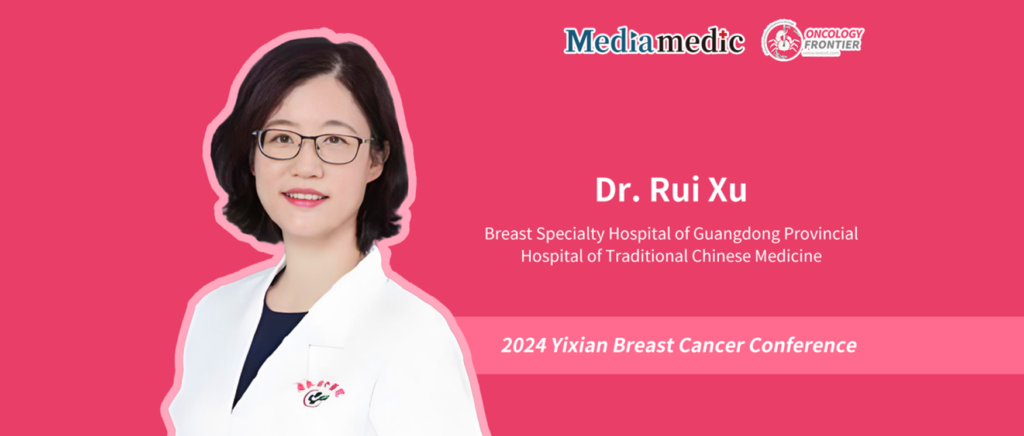
Editorial Note: The 2024 Yixian Breast Cancer Conference and the 2nd China Young Breast Cancer Consensus Conference, held on December 27–28 in Guangzhou, brought together leading experts in breast disease to discuss the latest advancements in treatment and management. The conference also focused on consensus guidelines for diagnosing and treating young breast cancer patients, aiming to improve cure rates and rehabilitation outcomes. At the event, Dr. Rui Xu from the Breast Specialty Hospital of Guangdong Provincial Hospital of Traditional Chinese Medicine shared cutting-edge findings in breast cancer surgery, offering new perspectives for treatment. In an interview with Oncology Frontier, Professor Xu provided an overview of the latest surgical advancements and developments in integrative medicine for breast cancer.Oncology Frontier: Could you summarize the content of your lecture at the conference and discuss its significance for breast cancer treatment and management?
Dr. Rui Xu:At this conference, I reviewed the surgical advancements in breast cancer treatment in 2024, with a particular focus on “minimizing” surgical intervention. My talk covered three key areas:
- Whether sentinel lymph node biopsy can be avoided.
- How to manage isolated tumor cells (ITC) in sentinel lymph nodes after neoadjuvant therapy. For patients with ITC in sentinel lymph nodes post-neoadjuvant treatment, we explored whether axillary lymph node dissection can be omitted.
- Surgical options for patients who achieve clinical complete response (CR) after neoadjuvant therapy, discussing whether minimally invasive techniques could replace further surgical interventions.
These three topics reflect an overarching trend of reducing the extent of surgical procedures. For instance, can we avoid axillary lymph node dissection or even bypass sentinel lymph node biopsy? So far, four studies have explored de-escalation of axillary lymph node surgery, including the SOUND study and the INSEMA study presented at this year’s SABCS. Both studies suggest that for specific breast cancer patients—such as older patients with small tumors (less than 2 cm), low-grade histology (grade 1–2), and HR+/HER2- profiles—axillary lymph node surgery or sentinel lymph node biopsy may be unnecessary, with no significant impact on survival, prognosis, or local recurrence risk.
However, whether this conclusion can be widely applied in clinical practice remains a topic of debate. Experts have discussed practical questions, such as how many patients meet these criteria and how willing patients are to accept de-escalation in the current healthcare environment. These considerations highlight the need for further discussion on the feasibility of reducing surgical intervention for patients.
Oncology Frontier: How can clinicians incorporate these emerging research findings into routine clinical practice?
Dr. Rui Xu: The growing body of research in breast cancer provides crucial insights, particularly the importance of accurate patient evaluation. For example, when considering “minimizing” surgical intervention, precise assessments are critical. This requires the use of advanced imaging and genomic tools, such as the 21-gene and 70-gene assays, to scientifically evaluate patients.
In clinical practice, it is essential to continuously explore and optimize the application of these technologies to ensure they deliver maximum benefits to patients.
Oncology Frontier: Integrative medicine in breast cancer treatment has always been a focus of your work. Can you share recent advancements and success stories in this area?
Dr. Rui Xu: In recent years, integrative medicine has made remarkable strides in breast cancer treatment. At the Breast Specialty Hospital of Guangdong Provincial Hospital of Traditional Chinese Medicine, where I practice, many patients seek care not only for conventional treatment options but also for complementary therapies offered through traditional Chinese medicine (TCM).
TCM is integrated throughout the various phases of breast cancer treatment—surgery, chemotherapy, radiotherapy, and consolidation therapy—primarily to reduce toxicity and enhance efficacy. For instance, TCM approaches have shown efficacy in managing endocrine therapy-related side effects, such as hot flashes, sweating, and bone pain. Traditional Chinese exercise therapies, such as Baduanjin, have also demonstrated significant benefits.
Notably, a study presented at last year’s SABCS revealed that acupuncture could effectively alleviate depressive symptoms in breast cancer patients, achieving notable results. These examples underscore the broad potential of TCM and herbal medicine in providing more comprehensive and personalized care for breast cancer patients.
Dr. Rui Xu
- Associate Chief Physician, PhD in Medicine
- Master’s Supervisor, Vice President of the Breast Specialty Hospital, Guangdong Provincial Hospital of Traditional Chinese Medicine
- Renowned Lingnan Doctor and Fourth “Outstanding Guangzhou Physician” Awardee
- Member/Deputy Secretary-General, Breast Disease Committee, Chinese Association of Traditional Chinese Medicine
- Executive Member, Breast Group, Minimally Invasive Tumor Treatment Committee, Chinese Anti-Cancer Association
- Member, Multidisciplinary Diagnosis and Collaboration Group, Tumor Marker Committee, Chinese Anti-Cancer Association
- Vice Chair, Breast Disease Professional Committee, Guangdong Association of Traditional Chinese Medicine
- Vice Chair, Breast Science Management Committee, Guangdong Medical Association
- Youth Editorial Board Member, Chinese Journal of General Surgery
- Recipient of the 2017 and 2023 Science and Technology Awards, Chinese Association of Traditional Chinese Medicine (Second Prize)
- National Champion, 2018 CBCS Breast Tumor Elite MDT Competition
- Recipient of the 2019 Higher Education Scientific Research Outstanding Achievement Award (Second Prize)
- Recipient of the 2023 Guangdong Science and Technology Progress Award (Second Prize)
Conclusion Dr. Rui Xu’s insights highlight the importance of reducing surgical interventions and integrating traditional Chinese medicine into breast cancer treatment. His approach reflects a commitment to enhancing patient outcomes and quality of life through personalized and holistic care strategies.


